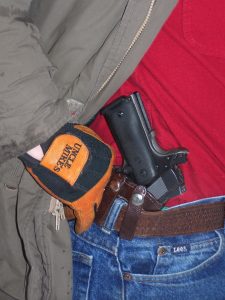Senior Editor
For the second time in two years, a federal judge has ruled against the District of Columbia’s “good reason” requirement to obtain a carry permit, saying that it “likely places an unconstitutional burden” on the right to carry firearms for self-defense outside the home.
U.S. District Judge Richard J. Leon issued an injunction pending an appeal, and ordered the District’s police department to stop requiring applicants to provide a “good reason.”
Writing in a 46-page opinion, Judge Leon noted, “In Heller, the Supreme Court’s unequivocally asserted that ‘the enshrinement of Constitutional rights necessarily takes certain policy choices off the table.’ The District’s understandable, but overly zealous, desire to restrict the right to carry in public a firearm for self-defense to the smallest possible number of law-abiding, responsible citizens is exactly the type of policy choice the Justices had in mind.”
He enjoined the District from “denying concealed carry licenses to applicants who meet all eligibility requirements other than the ‘good reason’ requirement.”
The complete opinion has been posted online by the Washington Post here.
This federal lawsuit was brought against the District by Matthew Grace and a gay gun rights organization, the Pink Pistols. It is the second challenge to the District’s restrictive carry law since Judge Frederick J. Scullin struck down as unconstitutional the city’s ban on carry outside the home.
Another lawsuit, brought by the Second Amendment Foundation, is currently on appeal since a different judge, Colleen Kollar-Kotelly, ruled in favor of the city earlier this year. That case is known as Wrenn v. District of Columbia, which is a follow-up to an earlier SAF lawsuit known as Palmer v. District of Columbia, which was decided by Scullin.
[pullquote align=”full” cite=”” link=”” color=”” class=”” size=””]
“Because the right to bear arms includes the right to carry firearms for self-defense both in and outside the home, I find that the District’s ‘good reason’ requirement likely places an unconstitutional burden on this right.”—Judge Richard J. Leon
[/pullquote]
When the District adopted its restrictive carry law, SAF brought the Wrenn challenge and Scullin was assigned that case. However, a three-judge panel of the U.S. Court of Appeals for the District disqualified Scullin in a challenge to his ruling, and essentially nullified it. The case was reassigned to Kollar-Kotelly, who ruled in favor of city in March.
But now the Leon decision appears to be in direct conflict with Kollar-Kotelly’s position.
SAF founder and Executive Vice President Alan M. Gottlieb told TGM that Judge Leon’s decision, while not about a SAF case, “Is a solid ruling in our favor. It’s exactly what Judge Scullin ruled in the Wrenn case.”
“Today’s order is a victory for Second Amendment rights and has real implications for the safety of law-abiding citizens,” said Chris Cox, executive director of the National Rifle Association’s Institute for Legislative Action. “The Supreme Court has held that the Second Amendment protects the core right of self-defense in the home, but as the District Court today reaffirmed, that right is just as important to ordinary citizens commuting to work or shopping for groceries in an unsafe neighborhood.”
NRA is supporting the lawsuit financially.
In his opinion, Judge Leon observed, “Because the right to bear arms includes the right to carry firearms for self-defense both in and outside the home, I find that the District’s ‘good reason’ requirement likely places an unconstitutional burden on this right.”
Most likely the District will appeal. With the loss of Supreme Court Associate Justice Antonin Scalia, who authored the landmark 2008 Heller ruling that struck down the District’s handgun ban and affirmed that the Second Amendment protects an individual civil right to keep and bear arms, gun-related cases have a new importance.
It was the second time in as many days that gun rights advocates received good news from a federal court. Judge Leon’s ruling came a day after a three-judge panel in the U.S. Ninth Circuit Court ruled that “the right to purchase and sell firearms is part and parcel of the historically recognized right to keep and bear arms.”




